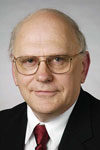Buss, UW–Madison’s second veterinary dean, to retire
Three decades of academic leadership is not how a farm boy from Minnesota imagined his career unfolding.

Buss
But it’s also not a path Daryl Buss will lament now that he has announced plans to retire from his position as dean of veterinary medicine at the University of Wisconsin–Madison.
“For someone who always said he never had any interest in administration, 32 years as a department chair and dean turned out to be a very rewarding experience,” says Buss, who will retire from both his administrative and faculty appointments next June.
Buss has served as dean since 1994, when he left the University of Florida’s College of Veterinary Medicine after 15 years as chair of the physiological sciences department.
“It is bittersweet to hear of Daryl’s retirement plans, as he was the first dean I had the opportunity to hire during my original term as chancellor,” says David Ward, UW–Madison interim chancellor. “After 17 years, I am proud of that decision. It is a testament to his talent as a leader and his dedication to the job that Wisconsin has one of the best veterinary schools in the country.”
Just the second dean in the School of Veterinary Medicine’s history, Buss says it was a daunting task to take over from Dean Bernard Easterday, who helped establish the school. But in the relatively new school he found an exciting environment open to innovation.
“The thing you don’t hear is, ‘We’ve never done it that way,’” Buss says. “It’s refreshing. The people here have always looked first at how we utilize our resources to serve students to the best of our ability.”
Chris Olsen, the school’s associate dean for academic affairs and a researcher and faculty member in Madison since 1995, likened the school’s growth during Buss’s tenure to the transition from youth to young adulthood.
“He participated not only in the leadership of the School of Veterinary Medicine, but in the leadership of UW–Madison at the campus level,” Olsen says. “And he’s built a program widely valued by the state of Wisconsin and widely recognized nationally as a premier place to learn and conduct research.”
Not that would Buss would claim responsibility for either. It’s the veterinary medicine faculty and staff who have made the school strong, he says, even as their numbers dwindled.
“Administrators can make few things happen themselves,” Buss says. “But they can definitely get in the way of things happening. I’ve seen my role as facilitating the success of some very good people.”
Those successes include considerable growth in both research expenditures and clinical activities.
“Looking at the number of cases we were seeing at the veterinary hospital back when I arrived compared to what we see these days, it’s just incredible,” Buss says.
The 2006 return of the Wisconsin Veterinary Diagnostic Laboratory to campus (after more than 40 years away) is another important milestone.
“It’s a separate unit, but there is a tremendous amount of collaboration back and forth,” Buss says. “And our students get to know the pathologists there, which is important because they will be the next users of that facility when they move on in their careers.”
In a week, Buss will open class for his last group of Cardiovascular Physiology students, an annual opportunity that the award-winning teacher relishes.
“I get to meet our first-year students right off the bat, before they’ve even had the opportunity to get into any issues that might make it necessary to meet with me as dean,” he says. “I get to know them without my dean hat on, and I get to do a little teaching. And for that I’ll always appreciate the indulgence of the faculty.”
Buss and his wife, Sharon, will be able to get to some plans they have yet to have the opportunity to undertake, he says. But the timing of his departure is particularly attuned to the near future for the School of Veterinary Medicine.
With a contentious budget process concluded, a sizeable number of faculty members set to retire soon and re-accreditation scheduled for 2015, now is an opportune time to select the school’s third dean, according to Buss.
“We’re at a point in the school’s maturation and various cycles where we need to revise and update or devise a completely new strategic plan,” he says. “That’s a process that would benefit from a new dean’s input, especially a dean that has had some time on the ground to get to know school well.”
